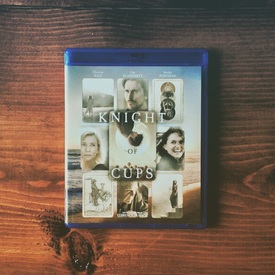
Say what you will about the direction Malick has been taking his films over the last few years, he's certainly captivated by a meandering search for something profound and human. This flavor of expression has been in Malick's DNA since Badlands, though taken a different shape, with a noticeably tighter structure, both in terms of story and technically speaking. Some could argue the tighter locked down structure is due to filmmaking constraints and limitations from decades ago. He's stated he would have liked to do far more handheld photography on Days of Heaven if he had the resources to do so. Essentially the spark was lit, but a full manifestation would take decades to achieve. Still, I can't imagine Days of Heaven taking on a different photographic form.
Knight of Cups is an ambitious and slight gem from Malick. It does not hit the outward grandiose emotional notes of The Thin Red Line or The Tree of Life -- however still muted in their presentation -- but he accomplishes what he set out to make -- both on location and in editing -- and achieves something inward and reflective. Malick is best enjoyed as an experience. If you're watching this film, you're invested, whether it's a little or a lot, whether it's technique or character, something is pulling you in, and it's now up to you to pull meaning out it. Christain Bale's character is drowning in chaos, lacking clear focus, no path forward. This is less of a movie about finding yourself through experiences of the past and present, and more of a eulogy for the resemblance of a normal life you thought you could conquer. You're on a path towards your ultimate demise. Unlike The Thin Red Line or The Tree of Life, this one probably won't have an incredibly deep philosophical impact with repeat viewings, but I don't want to make any concrete claims.
When contemplating Malick and his motives, trying to find connective tissue between Badlands to Knight of Cups, I recall Witt's line from The Thin Red Line. "Maybe all men got one big soul everybody's a part of, all faces are the same man." He's telling one story, weaving in and out of light and dark, hope and despair, chaos and harmony, which began with Kit and Holly's youthful naivety, then molded into Linda, then to Witt, and so on and so forth. As we move further away from where Malick began, the characters and structures are becoming more disjointed and lost in their worlds. With each new film, the weight of the characters increase, the personal journeys become denser, and answers become less attainable.
Knight of Cups is an ambitious and slight gem from Malick. It does not hit the outward grandiose emotional notes of The Thin Red Line or The Tree of Life -- however still muted in their presentation -- but he accomplishes what he set out to make -- both on location and in editing -- and achieves something inward and reflective. Malick is best enjoyed as an experience. If you're watching this film, you're invested, whether it's a little or a lot, whether it's technique or character, something is pulling you in, and it's now up to you to pull meaning out it. Christain Bale's character is drowning in chaos, lacking clear focus, no path forward. This is less of a movie about finding yourself through experiences of the past and present, and more of a eulogy for the resemblance of a normal life you thought you could conquer. You're on a path towards your ultimate demise. Unlike The Thin Red Line or The Tree of Life, this one probably won't have an incredibly deep philosophical impact with repeat viewings, but I don't want to make any concrete claims.
When contemplating Malick and his motives, trying to find connective tissue between Badlands to Knight of Cups, I recall Witt's line from The Thin Red Line. "Maybe all men got one big soul everybody's a part of, all faces are the same man." He's telling one story, weaving in and out of light and dark, hope and despair, chaos and harmony, which began with Kit and Holly's youthful naivety, then molded into Linda, then to Witt, and so on and so forth. As we move further away from where Malick began, the characters and structures are becoming more disjointed and lost in their worlds. With each new film, the weight of the characters increase, the personal journeys become denser, and answers become less attainable.
 RSS Feed
RSS Feed
